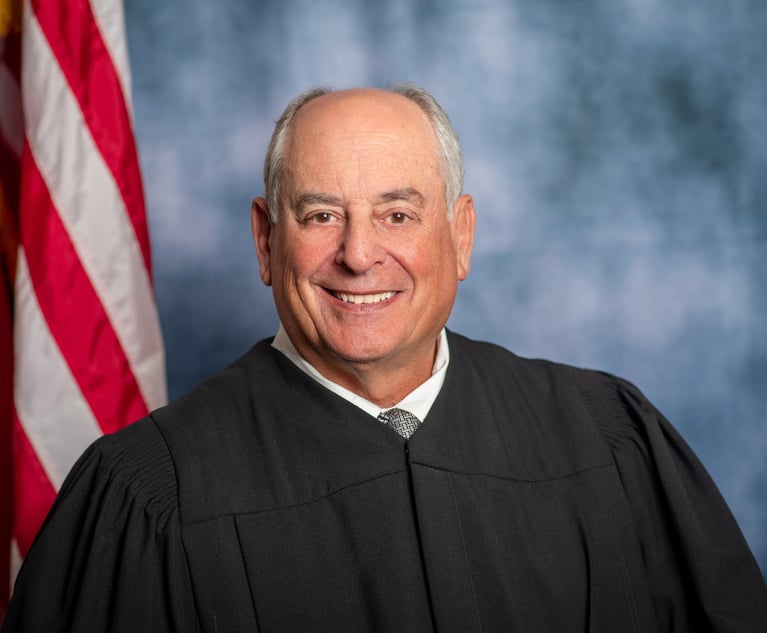 Judge Clay Land, Middle District of Georgia. (Courtesy photo)
Judge Clay Land, Middle District of Georgia. (Courtesy photo)Columbus Judge Leaves Some Claims Alive Against Officer in Fatal Shooting
Judge Clay Land said Columbus and a former officer cannot be sued for a teen's death and injuries to two passengers wounded during an officer's initial volley of 11 shots, but those from a second round after he reloaded can still be litigated.
December 17, 2019 at 12:42 PM
7 minute read
A federal judge refused to dismiss all the claims against a Columbus police officer and the city stemming from a high-speed chase that ended with a stolen car being chased into Alabama, where it was riddled by police gunfire that left the teenage driver dead and two passengers wounded.
Judge Clay Land of Georgia's Middle District said the officer, city and police chief are protected from the three lawsuits' claims for violations of state and federal law from damages resulting from the officer's first volley of 11 shots fired into the car as it backed up after crashing.
But, he said, a second fusillade of 10 more shots into the stopped car after the officer reloaded was "a different story."
Ruling on a defense motion for summary judgment, Land said the evidence thus far indicated that officer Allan Brown Jr. "was in no danger when he fired the second round of shots" and that the claims against him and the city based on those shots can proceed.
Land dismissed all the claims against Police Chief Ricky Boren, writing that there was no indication he acted unlawfully or was responsible for Brown's actions.
A lawyer representing the city and Brown—who is no longer with department—said they were "pleased that the court dismissed all of the claims against Chief Boren and most of the claims against officer Allan Brown and the city," said Page, Scrantom, Sprouse, Tucker & Ford partner Thomas Gristina via email.
"We will appeal what remains of the case to the Eleventh Circuit Court of Appeals and are confident that we will be successful in having the entire case dismissed," said Gristina, who is defending the case with firm colleagues James Clark, Jr. and Tyler Cashbaugh, and Columbus City Attorney Clifton Fay and staff attorney Lucy Sheftall.
The grandmother of the dead teen, 17-year-old Christian Redwine, is represented by Robert Wadkins Jr. of Columbus' Wadkins & Wadkins; Benjamin Wallace of Columbus' Brown & Adams; and Steven Couch of Birmingham's Couch & Firth. Plaintiff Hunter Tillis is represented by Renee Tucker, Forrest Johnson and Hannah Ward of Atlanta's Forrest B. Johnson & Associates; and plaintiff Hannah Wuenschel is represented by Mark Post of Columbus' Mark Post Law.
Post said he is still considering his options after Land's Dec. 13 ruling. The other lawyers did not immediately respond to a request for comment Monday.
As detailed in the order and other filings, the incident began when Redwine, accompanied by Tillis and Wuenschel, took a Pontiac G6 that belonged to a friend of his grandmother's from the house all three shared in Columbus.
The owner called police around 3:30 a.m. and reported that the 17-year-old had stolen the car.
A police captain in an unmarked car saw the Pontiac pull into the parking lot of a closed business, stop briefly, then leave an hour later. The officer began to follow the car, radioed in the description and learned it was reported stolen.
Redwine hit the gas when they realized the police were behind them, reportedly reaching speeds of more than 100 mph and "driving crazy, pulling up on the e-brake and making the car slide all over the place," according to a deposition Tillis gave later.
Brown was at the police station when the call came in reporting the chase. He jumped into a cruiser and joined in, chasing the car across a bridge over the Chattahoochee River into Phenix City, Alabama.
Redwine lost control and crashed into some bushes with Brown close behind, radioing in that the car had "wrecked out" and was "spinning."
Brown stopped behind behind the rear passenger side of the car and got out, as the Pontiac began backing up.
Brown started firing into the rear window and kept firing through the front passenger window as the car passed him.
Wuenschel could be heard screaming "No! Stop! Please! I got shot!" on Brown's dash cam video, as the Pontiac backed across the street and came to a "gentle stop," according to Tillis' deposition.
Brown ran out of ammunition, reloaded and kept firing through the Pontiac's windshield
Redwine died at the scene with 11 gunshot wounds. Willis was shot twice, with one bullet—fired during the second volley of shots—going through his nose and coming out of his mouth. Wuenschel was shot once in the shoulder during the first volley, with the bullet exiting near her elbow.
Redwine's grandmother Nancy Sorrells, Tillis and Wuenschel sued Brown, Boren and the consolidated government of Columbus for claims including Fourth and Fourteenth Amendment violations for the use of excessive force and unreasonable seizure, and state law claims for excessive force, negligence, wrongful death and battery.
All the defendants were sued in their official capacities, and Boren and Brown were also sued in their individual capacities. Land said all were shielded from liability for the initial chase and injuries from the initial volley of gunfire, since the officer could have reasonably believed that the car backing up could have swerved to hit him.
"The Eleventh Circuit has 'consistently upheld' an officer's use of deadly force in cases where the officer reasonably believed his life was endangered by a suspect who 'used or threatened to use his car as a weapon,'" Land wrote, citing a 2009 decision in McCullough v. Antolini, 559 F.3d 1201.
But he said if the plaintiffs' account is taken as true, as required when ruling on summary judgment, Brown was 15 feet from the Pontiac, which was either rolling slowly or stopped, when he reloaded and fired 10 more shots. Although Brown had said he heard the car's engine after it stopped, no such sound was heard on his car's dash-cam video, Land said.
"Based on these facts, no reasonable officer in Brown's position would have concluded that the Pontiac posed an imminent threat of serious physical harm to himself when Brown decided to shoot at the Pontiac ten more times," he wrote.
Land conceded that the defense motion was "complicated by the court's conclusions that the first round of shots did not violate the Fourth Amendment but that the second round of shots did. If any of the occupants of the vehicle were solely injured by the first round of shots, then they would have no claim."
But, he said, at this point, "the record is not fully developed for the court to decide this causation issue as a matter of law at this stage of the proceedings. Thus, while Brown is not entitled to summary judgment based on qualified immunity as to the second round of shots, it remains to be seen whether he is entitled to summary judgment based on causation."
Similarly, whether the city could be dismissed at this point is still unclear, Land said.
"The record has not been developed on the issue of whether CCG had an 'official policy' that caused the constitutional violation," he wrote.
Boren, he said, could not be held liable for any of the claims.
This content has been archived. It is available through our partners, LexisNexis® and Bloomberg Law.
To view this content, please continue to their sites.
Not a Lexis Subscriber?
Subscribe Now
Not a Bloomberg Law Subscriber?
Subscribe Now
NOT FOR REPRINT
© 2025 ALM Global, LLC, All Rights Reserved. Request academic re-use from www.copyright.com. All other uses, submit a request to [email protected]. For more information visit Asset & Logo Licensing.
You Might Like
View All
Georgia Supreme Court Honoring Troutman Pepper Partner, Former Chief Justice
2 minute read
'A 58-Year-Old Engine That Needs an Overhaul': Judge Wants Traffic Law Amended
3 minute read
Appeals Court Removes Fulton DA From Georgia Election Case Against Trump, Others
6 minute read
Family of 'Cop City' Activist Killed by Ga. Troopers Files Federal Lawsuit
5 minute readTrending Stories
- 1Sanctions Order Over Toyota's Failure to Provide English Translations of Documents Vacated by Appeals Court
- 2Roberts Calls Court's Relationship With Congress 'Strained.' Who's to Blame?
- 3Class Certification, Cash-Sweep Cases Among Securities Litigation Trends to Watch in 2025
- 4Buchanan Ingersoll Launches in Chicago With 17-Lawyer Team From Locke Lord
- 5$2M Settlement for Woman Struck by New Jersey Transit Bus
Who Got The Work
Michael G. Bongiorno, Andrew Scott Dulberg and Elizabeth E. Driscoll from Wilmer Cutler Pickering Hale and Dorr have stepped in to represent Symbotic Inc., an A.I.-enabled technology platform that focuses on increasing supply chain efficiency, and other defendants in a pending shareholder derivative lawsuit. The case, filed Oct. 2 in Massachusetts District Court by the Brown Law Firm on behalf of Stephen Austen, accuses certain officers and directors of misleading investors in regard to Symbotic's potential for margin growth by failing to disclose that the company was not equipped to timely deploy its systems or manage expenses through project delays. The case, assigned to U.S. District Judge Nathaniel M. Gorton, is 1:24-cv-12522, Austen v. Cohen et al.
Who Got The Work
Edmund Polubinski and Marie Killmond of Davis Polk & Wardwell have entered appearances for data platform software development company MongoDB and other defendants in a pending shareholder derivative lawsuit. The action, filed Oct. 7 in New York Southern District Court by the Brown Law Firm, accuses the company's directors and/or officers of falsely expressing confidence in the company’s restructuring of its sales incentive plan and downplaying the severity of decreases in its upfront commitments. The case is 1:24-cv-07594, Roy v. Ittycheria et al.
Who Got The Work
Amy O. Bruchs and Kurt F. Ellison of Michael Best & Friedrich have entered appearances for Epic Systems Corp. in a pending employment discrimination lawsuit. The suit was filed Sept. 7 in Wisconsin Western District Court by Levine Eisberner LLC and Siri & Glimstad on behalf of a project manager who claims that he was wrongfully terminated after applying for a religious exemption to the defendant's COVID-19 vaccine mandate. The case, assigned to U.S. Magistrate Judge Anita Marie Boor, is 3:24-cv-00630, Secker, Nathan v. Epic Systems Corporation.
Who Got The Work
David X. Sullivan, Thomas J. Finn and Gregory A. Hall from McCarter & English have entered appearances for Sunrun Installation Services in a pending civil rights lawsuit. The complaint was filed Sept. 4 in Connecticut District Court by attorney Robert M. Berke on behalf of former employee George Edward Steins, who was arrested and charged with employing an unregistered home improvement salesperson. The complaint alleges that had Sunrun informed the Connecticut Department of Consumer Protection that the plaintiff's employment had ended in 2017 and that he no longer held Sunrun's home improvement contractor license, he would not have been hit with charges, which were dismissed in May 2024. The case, assigned to U.S. District Judge Jeffrey A. Meyer, is 3:24-cv-01423, Steins v. Sunrun, Inc. et al.
Who Got The Work
Greenberg Traurig shareholder Joshua L. Raskin has entered an appearance for boohoo.com UK Ltd. in a pending patent infringement lawsuit. The suit, filed Sept. 3 in Texas Eastern District Court by Rozier Hardt McDonough on behalf of Alto Dynamics, asserts five patents related to an online shopping platform. The case, assigned to U.S. District Judge Rodney Gilstrap, is 2:24-cv-00719, Alto Dynamics, LLC v. boohoo.com UK Limited.
Featured Firms
Law Offices of Gary Martin Hays & Associates, P.C.
(470) 294-1674
Law Offices of Mark E. Salomone
(857) 444-6468
Smith & Hassler
(713) 739-1250






